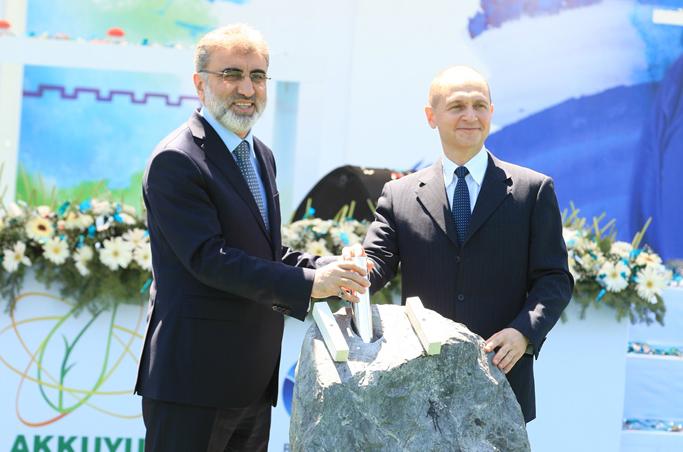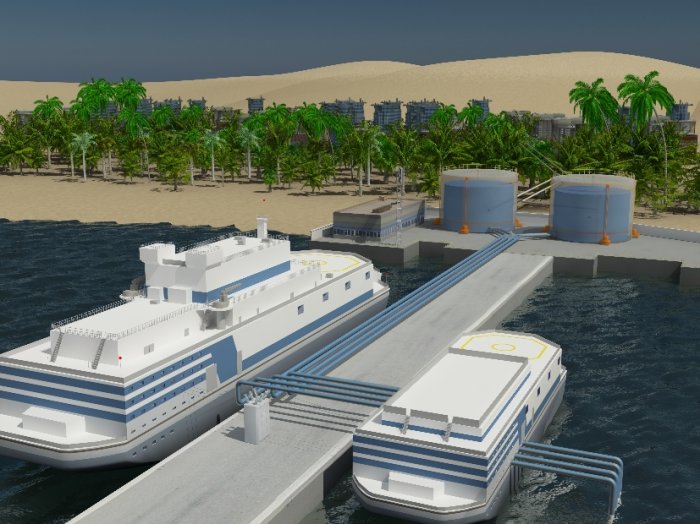
Russia expands its nuclear power solutions to Far East and Middle East
Russia has become a world leader in nuclear technology, after considerable investment in research and development. According to research by the World Nuclear Association released in March 2015, Russia is "moving steadily forward with plans for much expanded role of nuclear energy, including development of new reactor technology."
In the Middle East, Russia and through its nuclear arm “Rosatom” has been expanding lately through various projects and tenders in various countries. In Turkey, a ceremony took place lately and was dedicated to laying the foundation of the off-shore hydraulic engineering structures (OHES) of “Akkuyu” NPP construction project. The event was attended by the Turkish Minister of Energy and Natural Resources Taner Yıldız and the Chief Executive Officer of “Rosatom” SC Sergey Kiriyenko. The first Turkish nuclear power plant is a strategic project between Turkey and Russia. The NPP will be an important component for a stable and secure energy supply of the Republic of Turkey. Construction of “Akkuyu” NPP will allow creating thousands of new jobs. At the peak period of construction of the plant up to 10 thousand workers will work at the construction site
Moving Far East, on 16 April, the National Nuclear Energy Agency in Indonesia (BATAN) declared the Russian-Indonesian Consortium the preferred bidder for the predesign stage within the project for construction of a multifunctional power reactor in Indonesia.
Apart from the Indonesia companies Rekayasa Engineering and Kogas Driyap Consultant, the Consortium also includes NUKEM Technologies GmbH, Rosatom’s subsidiary company. NUKEM will implement the project jointly with other Rosatom’s enterprises that possess extensive experience in reactor design and construction. These are Atomstroyexport JSC, OKBM Afrikantov JSC and FGUP NII NPO LUCH.
The Russian State Nuclear Corporation "Rosatom" continues to focus on growth in Asia, which the company regards as one of the most promising foreign markets for nuclear power. The company intends to participate in the tender for the construction of the first nuclear power plant in Malaysia, if it is declared.
Demand for nuclear power continues to grow globally, said the head of International Atomic Energy Agency, Yukiya Amano, during the 48th Conference of the Japan Atomic Industrial Forum, in which the Russian delegation also took part. Some 13 of the 30 countries using nuclear energy build new nuclear power plants. And out of 65 new nuclear power plants under construction, two-thirds are in Asia. That is nothing surprising, given the economic growth of Asia in recent years, "- said Amano.
Rosatom, Russia's state-owned nuclear company has 29 nuclear projects around the world and aims to increase the number to 34 through agreements currently being negotiated. The latest deal was struck with Jordan to build its first nuclear plant, worth $10 billion, on March 24
Canada's AECL, French Areva and Japan's Mitsubishi are among Rosatom's competitors, although Sergey Kondratyev, head of economics at the Institute for Energy and Finance, believes the Russian company's biggest advantage is that it offers lower costs."
At present the potential order volume for reactors of the Russian VVER technology is estimated to be 80 units by 2030. Among the potential partner countries: Finland, Slovakia, Hungary, Brazil, Saudi Arabia, Malaysia, Indonesia and South Africa.
Saudi Arabia currently does not have a nuclear power station, but has a great interest in nuclear technology for civil and peaceful purposes, and plans to construct as many as 16 reactors in the next 20 years to help meet growing demand for electricity and desalination. The Kingdom has also signed separate nuclear cooperation agreements with France, China and, most recently, South Korea. A 2010 royal decree identified nuclear energy as essential to help meet growing energy demand for both electricity generation and water desalination while reducing reliance on hydrocarbon resources.
In the Middle East, Russia and through its nuclear arm “Rosatom” has been expanding lately through various projects and tenders in various countries. In Turkey, a ceremony took place lately and was dedicated to laying the foundation of the off-shore hydraulic engineering structures (OHES) of “Akkuyu” NPP construction project. The event was attended by the Turkish Minister of Energy and Natural Resources Taner Yıldız and the Chief Executive Officer of “Rosatom” SC Sergey Kiriyenko. The first Turkish nuclear power plant is a strategic project between Turkey and Russia. The NPP will be an important component for a stable and secure energy supply of the Republic of Turkey. Construction of “Akkuyu” NPP will allow creating thousands of new jobs. At the peak period of construction of the plant up to 10 thousand workers will work at the construction site
Moving Far East, on 16 April, the National Nuclear Energy Agency in Indonesia (BATAN) declared the Russian-Indonesian Consortium the preferred bidder for the predesign stage within the project for construction of a multifunctional power reactor in Indonesia.
Apart from the Indonesia companies Rekayasa Engineering and Kogas Driyap Consultant, the Consortium also includes NUKEM Technologies GmbH, Rosatom’s subsidiary company. NUKEM will implement the project jointly with other Rosatom’s enterprises that possess extensive experience in reactor design and construction. These are Atomstroyexport JSC, OKBM Afrikantov JSC and FGUP NII NPO LUCH.
The Russian State Nuclear Corporation "Rosatom" continues to focus on growth in Asia, which the company regards as one of the most promising foreign markets for nuclear power. The company intends to participate in the tender for the construction of the first nuclear power plant in Malaysia, if it is declared.
Demand for nuclear power continues to grow globally, said the head of International Atomic Energy Agency, Yukiya Amano, during the 48th Conference of the Japan Atomic Industrial Forum, in which the Russian delegation also took part. Some 13 of the 30 countries using nuclear energy build new nuclear power plants. And out of 65 new nuclear power plants under construction, two-thirds are in Asia. That is nothing surprising, given the economic growth of Asia in recent years, "- said Amano.
Rosatom, Russia's state-owned nuclear company has 29 nuclear projects around the world and aims to increase the number to 34 through agreements currently being negotiated. The latest deal was struck with Jordan to build its first nuclear plant, worth $10 billion, on March 24
Canada's AECL, French Areva and Japan's Mitsubishi are among Rosatom's competitors, although Sergey Kondratyev, head of economics at the Institute for Energy and Finance, believes the Russian company's biggest advantage is that it offers lower costs."
At present the potential order volume for reactors of the Russian VVER technology is estimated to be 80 units by 2030. Among the potential partner countries: Finland, Slovakia, Hungary, Brazil, Saudi Arabia, Malaysia, Indonesia and South Africa.
Saudi Arabia currently does not have a nuclear power station, but has a great interest in nuclear technology for civil and peaceful purposes, and plans to construct as many as 16 reactors in the next 20 years to help meet growing demand for electricity and desalination. The Kingdom has also signed separate nuclear cooperation agreements with France, China and, most recently, South Korea. A 2010 royal decree identified nuclear energy as essential to help meet growing energy demand for both electricity generation and water desalination while reducing reliance on hydrocarbon resources.
Share:
ADD TO EYE OF Riyadh
MOST POPULAR
Saudi Real Estate Refinance Company Signs Deal to Boost Residential Mortgage Market Stability
Monday 16 February, 2026 2:14SABIC inks raw materials supply deal for PIF-Pirelli tire manufacturing JV
Monday 16 February, 2026 2:55KHC says xAI revaluation increases NAV by SAR 11.6B
Monday 16 February, 2026 1:37ADNOC Group's listed companies report AED190.1 billion in revenues for 2025
Monday 16 February, 2026 1:30 ×



























